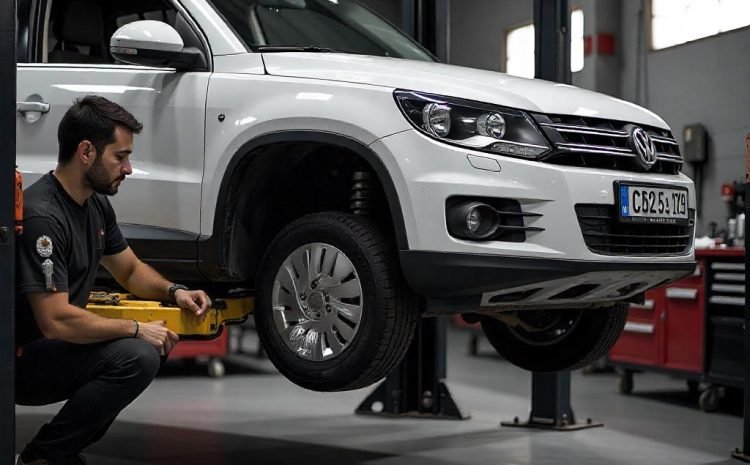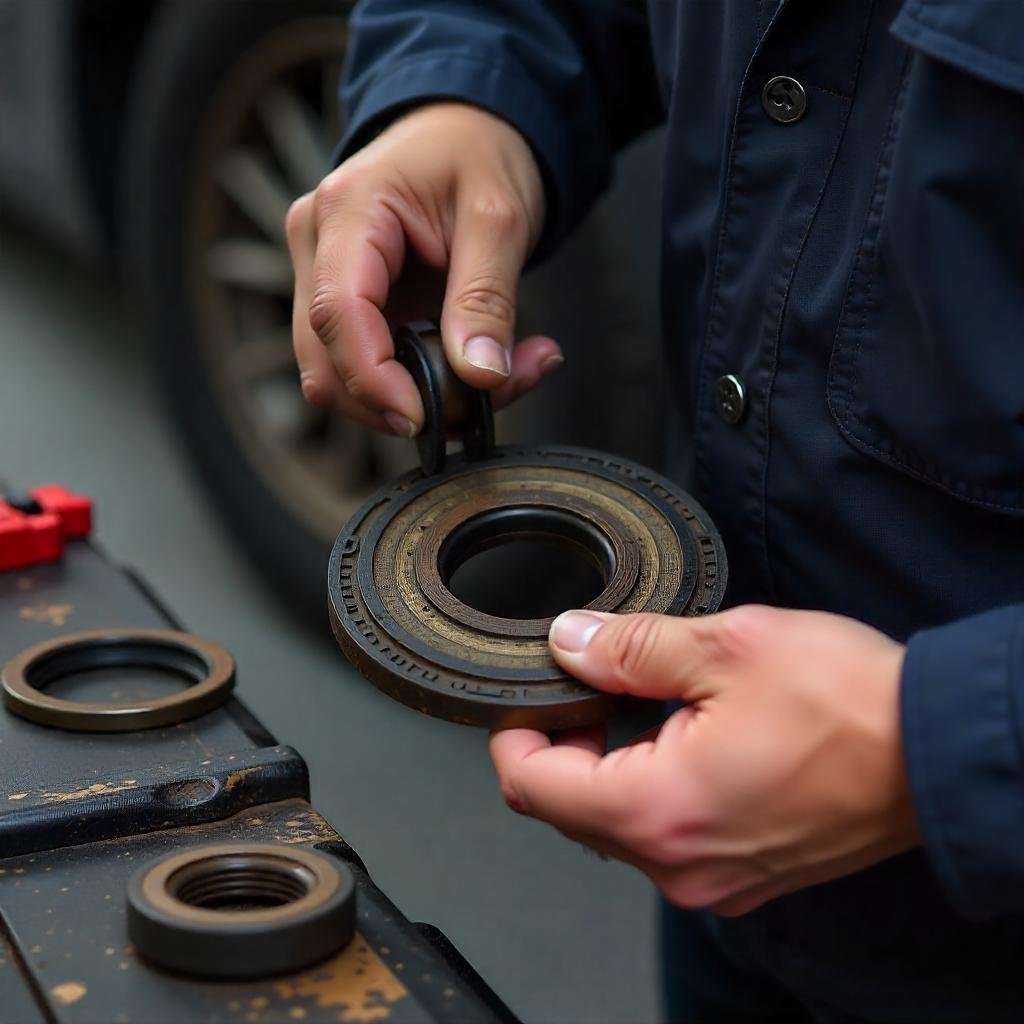Noticing oil leaks near your Volkswagen Tiguan’s engine and transmission? A worn-out rear main seal can cause oil loss, crankshaft damage, and even transmission issues if ignored. High engine heat and a faulty PCV valve are common reasons for rear main seal failure in Dubai. Our expert VW Tiguan rear main seal replacement in Dubai includes a full diagnosis, OEM seal installation, and pressure testing to prevent future leaks. Book now and get a 15% discount—protect your engine before oil loss leads to costly repairs!

The rear main seal is a circular oil seal positioned at the back of the Volkswagen Tiguan’s engine, where the crankshaft meets the transmission. Its primary role is to prevent engine oil leaks by sealing the rotating crankshaft, ensuring oil stays inside the engine block.
A failing rear main seal can lead to oil leaks, crankshaft damage, and engine performance issues, making timely replacement essential.
A rear main seal leak in a Volkswagen Tiguan can result in oil loss, crankshaft damage, and transmission contamination. Below are the six most common causes of rear main seal failure with specific technical reasons:
To avoid rear main seal failure in Volkswagen Tiguan, regular PCV valve servicing, synthetic oil changes, and proper transmission realignment are essential. If you notice oil leakage from the engine-transmission area, schedule a professional VW Tiguan rear main seal replacement in Dubai before it leads to major engine damage.

A rear main seal leak in a Volkswagen Tiguan can cause oil loss, engine wear, and transmission issues. The seal sits between the engine and transmission, making leaks hard to spot. If ignored, it can lead to expensive repairs. Here are the key signs that you may need a VW Tiguan rear main seal replacement:
Ignoring these signs can lead to serious engine damage. If you notice any of these symptoms, schedule a VW Tiguan rear main seal replacement in Dubai before the problem worsens.
A leaking rear main seal in a Volkswagen Tiguan can cause more than just an oil stain under your car. It directly affects engine performance, transmission function, and long-term vehicle reliability. If left unaddressed, it can lead to serious mechanical failures. Below are the specific risks of delaying a VW Tiguan rear main seal replacement:
The rear main seal sits around the crankshaft flange, keeping oil inside the engine. If the seal leaks, less oil reaches the crankshaft bearings, increasing metal-to-metal contact. Over time, this leads to bearing failure, crankshaft scoring, and even engine seizure.
In Volkswagen Tiguan models with a DSG gearbox, leaked engine oil can seep into the transmission bell housing. This contaminates the mechatronic unit, clutch packs, and flywheel, causing delayed gear shifts, transmission overheating, and internal damage.
The Volkswagen Tiguan’s turbocharged engine relies on a timing chain lubrication system. Oil loss from a rear main seal leak lowers overall oil pressure, reducing lubrication to the timing chain and camshafts. This accelerates wear, leading to timing chain slack and potential engine misfires.
In manual transmission Volkswagen Tiguan models, a leaking rear main seal allows oil to coat the clutch disc. This causes clutch slipping, loss of power, and difficulty shifting gears. If ignored, the flywheel may overheat and develop hot spots, requiring a full clutch and flywheel replacement.
If oil from a leaking rear main seal enters the exhaust system, it burns at high temperatures, damaging the catalytic converter. This results in excessive exhaust smoke, reduced fuel efficiency, and costly emissions system repairs.
Prolonged oil leaks degrade the engine block housing where the rear main seal sits. The constant oil seepage and contamination can lead to corroded aluminum surfaces, making future seal replacements more complex and expensive.
Ignoring a rear main seal leak in your Volkswagen Tiguan can cause permanent engine and transmission damage. If you notice oil loss, burning oil smell, or transmission slipping, schedule a VW Tiguan rear main seal replacement in Dubai before it leads to a complete engine failure.
At our Volkswagen repair center in Dubai, we use advanced tools and proven techniques to detect a rear main seal leak before recommending a VW Tiguan rear main seal replacement. Here’s how we identify the problem with precision and accuracy:
At our Volkswagen repair center in Dubai, we provide professional VW Tiguan rear main seal replacement at a market-competitive price. Since the rear main seal is located between the engine and transmission, replacing it requires removing the gearbox, making it a labor-intensive service. Our expert technicians ensure precise installation using OEM Volkswagen rear main seals to prevent future leaks.
If your Volkswagen Tiguan is leaking oil from the rear main seal, contact us today for a detailed cost estimate. We provide transparent pricing with no hidden charges for your VW Tiguan rear main seal replacement in Dubai. Book your service now and take advantage of our 15% labor discount!
Trust our team of Expert Volkswagen Mechanics at our Volkswagen Service Center in Dubai for all your Volkswagen Repair and service needs.
Our Top-Notch Volkswagen Service Center in Dubai have the advanced diagnostic tools and Volkswagen experts to accurately identify and resolve any issues with your Volkswagen.
With over 1200+ Volkswagen repaired, our Volkswagen Service Center in Dubai is the trusted Garage for comprehensive and expert Volkswagen Repair services.
Most of the vehicles get damaged just because of maintenance neglect you take
Yes, a leaking rear main seal can lead to a gradual drop in oil levels, which affects oil pressure inside the engine. Since the rear main seal is responsible for keeping engine oil sealed inside the crankshaft area, a persistent leak can reduce lubrication efficiency. If oil pressure drops too low, it can trigger the low oil pressure warning light on your Volkswagen Tiguan’s dashboard, increasing the risk of engine overheating or internal damage.
The rear main seal is considered a wear-and-tear component, which means it is not always covered under standard Volkswagen warranties. However, if your Volkswagen Tiguan is still under a powertrain warranty, the dealership may cover rear main seal replacement costs. If the seal fails due to manufacturing defects or excessive oil pressure issues, some extended warranties may include this repair. At our Dubai repair center, we offer affordable VW Tiguan rear main seal replacement with OEM parts, ensuring long-term reliability.
Yes, even a minor rear main seal leak can lead to major engine damage if ignored. Since the seal prevents oil from leaking out of the crankshaft, any oil loss over time reduces lubrication to key engine components. This can result in crankshaft wear, excessive heat buildup, and increased friction inside the engine block. Additionally, oil leaking onto the transmission components can lead to clutch contamination in manual models or flywheel damage in automatic DSG versions.
A severe rear main seal leak can cause oil to seep into the bell housing, where it may contaminate the starter motor. If oil gets inside the starter’s electrical connections, it can cause slow engine cranking, starting failures, or complete motor burnout. In some cases, this may lead to a need for both a rear main seal replacement and a new starter motor installation.
No, an engine flush will not fix a rear main seal leak. Engine flushes are designed to remove carbon buildup and sludge, but they do not repair damaged rubber seals. In some cases, using an aggressive engine flush additive can weaken aging seals further, making leaks worse. The only permanent solution for a rear main seal leak in a Volkswagen Tiguan is to replace the seal with an OEM part and ensure that the crankcase pressure is properly regulated.
Turbocharged Volkswagen Tiguan 2.0 TSI engines produce higher internal temperatures and oil pressure, which accelerates rubber seal degradation. The increased crankcase pressure from turbo boost cycles can also put additional stress on the rear main seal, leading to early wear and oil leaks. Regular PCV valve maintenance and using Volkswagen-approved synthetic oil can help prolong the seal’s lifespan in turbo models.
If your Volkswagen Tiguan has a manual transmission, it’s highly recommended to inspect and replace the clutch disc or flywheel if they show signs of oil contamination. When the rear main seal leaks, engine oil can soak into the clutch disc, causing slipping, shuddering, or poor gear engagement. In automatic DSG transmissions, oil leaks can affect the torque converter, leading to slipping gears or erratic shifting.
“Talk to a Volkswagen Expert Now by booking a call, and get personalised solutions for your Volkswagen unique needs and requirements.”
+971564646081
